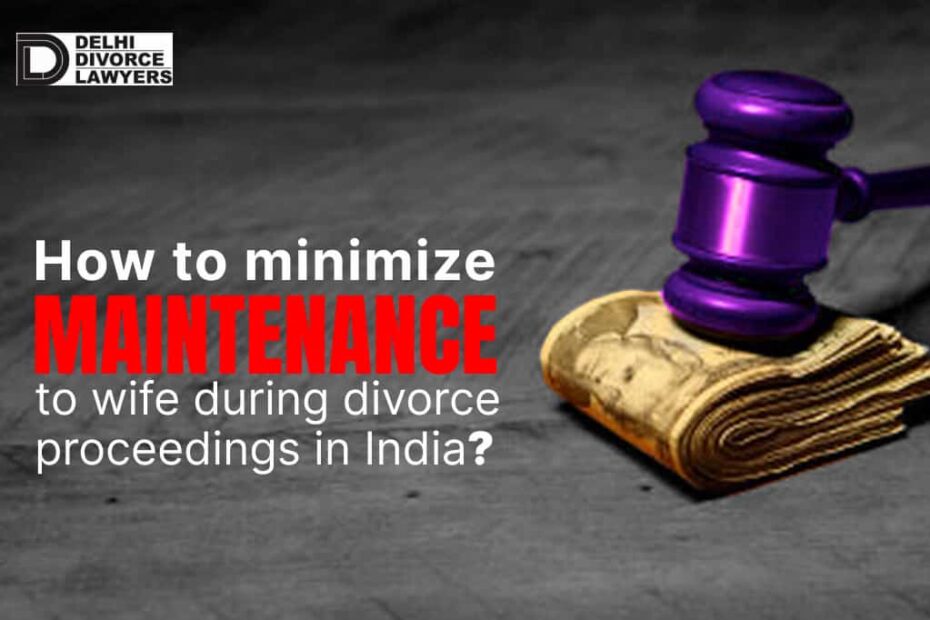In India, alimony or maintenance is a legal obligation on a person to provide financial support to their spouse after separation or divorce. The amount of alimony is decided by the court, and it varies depending on factors such as the income of the parties, their lifestyle, and their respective needs.
Here are some tips that may help in minimizing alimony payments in India:
Reach a settlement: It is always advisable to try and reach a settlement with your spouse instead of fighting a long legal battle in court. A settlement can help both parties to agree on a mutually acceptable amount of alimony and avoid unnecessary expenses on legal fees.
Prove your financial position: If you are the spouse who is liable to pay alimony, you can try to prove that you are not financially capable of paying a substantial amount. You can provide documents to show your current income, expenses, and liabilities.
Prove your wife\’s financial position: You can bring your wife\’s financial position including all movable & immoveable properties to the court\’s notice. You can provide documents to show their income, expenses, and assets.
Provide evidence of misconduct: If your spouse has committed any wrongdoing that has led to the breakdown of the marriage, such as infidelity, cruelty, or desertion, you can try to prove it in court. This may help in reducing the amount of alimony or even denying it altogether. To provide evidence of misconduct, it is important to collect as much evidence as possible. This may include photographs, videos, witness statements, emails, text messages, and other documents that support your claims. It is important to ensure that the evidence is admissible in court and obtained legally.
For instance, in cases of adultery, evidence can include photographs, hotel receipts, credit card statements, and text messages that show that the spouse has been involved in a sexual relationship with someone else. In cases of cruelty, evidence can include medical records, police reports, and witness statements that demonstrate physical, mental, or emotional abuse.
It is important to note that evidence of misconduct alone may not be sufficient to reduce or deny alimony payments. The court will consider the evidence in the context of the overall circumstances of the case, including the financial needs of the parties and their ability to pay.
Here are some landmark cases related to reducing maintenance amount for wife in India:
Smt. Mamta Jaiswal vs Rajesh Jaiswal: It reinforces the principle that maintenance to the wife is a legal obligation of the husband and highlights the importance of ensuring that wives are able to live with dignity and respect. The case provides guidance to courts in determining the amount of maintenance to be awarded and highlights the obligation of husbands to maintain their wives.
Shailja & Anr. v. Khobbanna: In this case, the Supreme Court held that maintenance to wife should be reasonable and proportionate to the income of the husband. The Court also stated that maintenance should not be granted as a source of profit for the wife.
Sunita Kachwaha v. Anil Kachwaha: In this case, the Supreme Court held that maintenance to wife should be awarded based on the income and living standards of the parties involved. The Court also stated that the wife is entitled to live with dignity and respect, and maintenance should be awarded accordingly.
Savitaben Somabhai Bhatiya v. State of Gujarat: In this case, the Supreme Court held that maintenance to wife should not be awarded as a matter of course, and the wife should prove that she is unable to maintain herself. The Court also stated that maintenance should be awarded based on the needs of the wife and the income of the husband.
Hiral P. Harsora v. Kusum Narottamdas Harsora: In this case, the Supreme Court held that maintenance to wife should not be awarded in a mechanical manner and should be based on the facts and circumstances of each case. The Court also stated that the husband\’s income, assets, and liabilities should be considered while awarding maintenance.
Vinny Parmvir Parmar v. Parmvir Parmar: In this case, the Bombay High Court held that maintenance to wife should not be awarded based on the wife\’s expenses alone but should also take into account the husband\’s expenses and liabilities. The Court also stated that maintenance should not be awarded in a manner that would deprive the husband of his own means of subsistence.

